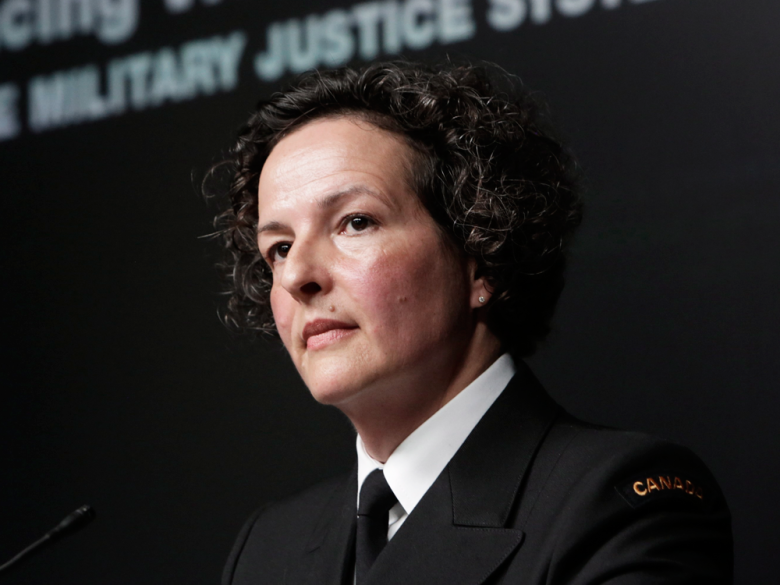Despite being warned what they were doing was potentially illegal and punishable by imprisonment, top military officers failed to disclose important documents under the Access to Information law, the National Post can reveal.
The military officials claimed an internal report highlighting problems with the court martial system didn’t exist — even though there were electronic and paper copies of the draft document.
However, other officers were so worried about the ethical and legal issues that they alerted the highest level — with the office of Canada’s top soldier, Chief of the Defence Staff Gen. Jon Vance, being warned that such a response was “potentially unlawful.”
Details about the 2017 incident have emerged just a month after an Ottawa court heard about alleged attempts by military officers to hide records needed by Vice Admiral Mark Norman to defend himself against one count of breach of trust. The two incidents are separate but some military sources warn they show a pattern of failure to adhere to the access law.
The 2017 incident involves responses sent by the Office of the JAG (Judge Advocate General) to the Directorate of Access to Information, according to an Aug. 28, 2017 Canadian Forces briefing note.
Judge Advocate General Commodore Geneviève Bernatchez, who oversees the military justice system and is the top legal advisor to the Canadian Forces, endorsed a recommendation by one of her staff to tell Department of National Defence’s access to information officials that the documents didn’t exist, according to the briefing document for Vance’s office. The JAG organization sent a “nil” response following two requests for a draft report of the court martial system review.
However, two officers on Bernatchez’s staff prepared a briefing for Vance because they felt that military regulations required them to alert the senior leadership about potential wrongdoing.
Vance’s office was told that the response “that the requested records do not exist is potentially unlawful in that it seeks to deny a right of access to a record.
“The records that were requested clearly exist, and have existed since at least 21 July 2017.”

The briefing warned that it was an indictable offence under the Access to Information law to conceal a record with “intent to deny a right of access.”
“This offence is punishable by up to 2 years imprisonment,” Vance’s office was told.
At least three officers in Bernatchez’s organization raised ethical or legal concerns about the decision to withhold the requested records but were ignored, according to the document.
The military’s National Investigation Service examined the concerns but determined that there was insufficient evidence to “support that an offence had occurred,” the DND noted in a statement to Postmedia Wednesday.
The decision to claim “the ‘nil reply’ was due to a misapplication of the Access to Information Act and was not due to malicious intent,” the DND stated.
Information Commissioner Caroline Maynard, who worked as the legal counsel at the Judge Advocate General’s Office from 2001 to 2006, investigated the incident and noted in a Dec. 12, 2018 letter to the DND that the department’s claim that no records existed because the document was a draft report “is not an appropriate reply” under the law.
Her investigation found the records did exist and she flagged what her office considered “a lack of oversight” on the part of the DND.
This offence is punishable by up to 2 years imprisonment
The briefing to Vance’s office outlined the behind-the-scene debate over how to respond to the access request for the report.
One officer on Aug. 14, 2017 wrote her supervisors to express her ethical and legal concerns about the decision to claim the records didn’t exist. On Aug. 15 and Aug. 16, 2017 another officer talked to the deputy JAG for Military Justice, Col. David Antonyshyn, to “advise him of the legal and potentially criminal risks associated with the Office of the JAG’s denial of the existence of a record that clearly existed.”
On Aug. 16, 2017 another officer emailed Antonyshyn to remind him that a copy of the requested record had been given to Bernatchez and warned of “the legal risks associated with a denial of this record’s existence.”
Bernatchez’s office also sought advice from a legal advisor who pointed out that such draft documents were not exempt from being released under the access law.
Despite the concerns and advice, the JAG’s office told the DND access branch that no records existed.
The records that were requested clearly exist
The DND in its statement to Postmedia noted steps were being taken to improve the department’s compliance with the law. The department also released a Jan. 11, 2019 response to the Information Commissioner, in which DND Deputy Minister Jody Thomas said she would consult with Vance and Bernatchez to consider ways to improve complying with the law.
“We remain committed to maintaining open and transparent access to information services to Canadians and have taken steps to strengthen the function,” the DND added in its statement.
This is the second allegation that the Canadian Forces have been involved in attempts to prevent the disclosure of records under the Access law. In December a witness at the court hearing involving Vice Admiral Norman outlined how a brigadier general informed him of a method used by the military to avoid having to produce records. The witness, whose name is protected by the court to prevent retaliation by the Canadian Forces, said he was told to send a “nil return” to an access request, indicating no documents related to Norman could be found.
When he sought clarification, the witness testified the general smiled and told him: “Don’t worry, this isn’t our first rodeo. We made sure we never used his name.”
Vance is scheduled to testify at the end of the month in the Norman case about those allegations.





























